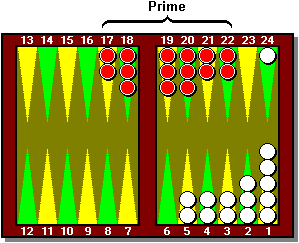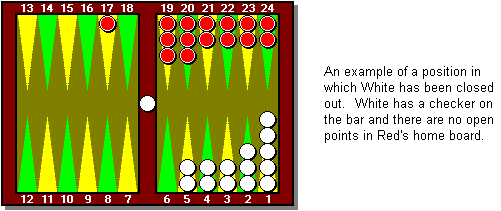
From: Backgammon Galore : Rules of Backgammon

A prime is a sequence of six consecutive blocks. When a prime is in place, none of the opponent's checkers can move past as long as the prime remains intact. That's because a checker can't touch down on a blocked point and never moves more than six points in a single hop.
In the following example, Red has constructed a prime on his side of the board and trapped White's outermost checker.

When your opponent constructs a prime in his home board and then hits one of your blots, you are "closed out." Your hit checker will remain on the bar and you will not be able to make any further move until the opponent opens one of the points in his home board.

You must always play the numbers you have rolled if there is any legal way to do so. There is no option to pass your turn in backgammon, or to reroll any roll of the game.
There is no limit to the number of checkers that can be on one point. In fact, it is possible to have all fifteen of your checkers on one point at the same time (though this is very rare). When you have more than five checkers on a point, it is usually a good idea to stack some of the checkers on top of others.
There is no limit to the number of checkers that can be on the bar. I have seen as many as six checkers on the bar at once.
Yes, if you have no other checkers on the bar, then you must use the remaining numbers of your roll to move either the checker you just entered or other checkers. But if you can't enter all of your checkers on the bar, then you must enter as many as you can and forfeit the remainder of your turn.
A stalemate position would be one in which neither player could make any future play. You can imagine such a position if both players had checkers on the bar and closed home boards. Neither player would be able to enter his checker or make any other move, and the game would be stuck.
But such a position cannot be reached through legal play. Here's why. Suppose a double closeout position were somehow possible. Either you or your opponent would have to close your home board first. Let's say it's you.
The rules require that you use both numbers of your roll (all four numbers of a double) if possible. If you can make moves which do not involve bearing off, you are free to do so. Otherwise, you must bear off if that is your only legal play.
Here is an example of where bearing off is mandatory. White has rolled 4 and 3. In this position, he must bear off one checker from each of the three and four points -- it's the only way he can use the numbers he rolled.

Here is an example where White may bear off either one or two checkers. If White bears off two checkers, he will leave a blot. But this isn't necessary. Instead White can use his 2 to move a checker from the four point to the two point and then use the 4 to bear off one of the checkers on two point. The result is one checker off and no blots.

The only time you may bear off a checker from a point lower than the one indicated by your roll is when there are no checkers on any higher points. You may use a 5 to bear off from the three point, for example, only if you have no checkers on the the four point, five point, and six point (and, of course, no checkers outside your home board).
In the following position, White can (and must) use the 6 to bear off one checker from the five point, but he has no way to play the 4. White can't use the 4 to bear off from the three point because he still has a checker on the five point. And White can't move the checker on the five point because it is blocked.

Here is another example. This time White is forbidden from bearing off the checker on the six point! That's because the only way he can use both of the numbers he rolled is to move from the six point to the two point (using the 4) and then bear off one checker from the five point (using the 6).

Yes, you can double any time it is your turn and you have not yet rolled the dice. This even includes turns in which you don't get to roll because you have checker on the bar and your opponent's board is closed.
No, there is no limit. The only restriction is that the same player cannot double twice in a row.
Let's start at the beginning. If one player (A) thinks he has an advantage in the game, he can double his opponent (B). If B accepts the double, the cube is now at 2 and the game is worth two points. This is a plain, ordinary double.
There is an optional rule that says if B thinks he is the favorite after accepting a double, he may immediately turn the cube to 4 without forfeiting his option to double again later. This is called a "beaver."
Some people play with another rule that says if A still believes he is the favorite after a beaver from B, he may immediately turn the cube another notch to 8. This is called a "raccoon."
And some people play with yet another rule that says if B still believes he is the favorite after a raccoon from A, he may immediately turn the cube another notch to 16. This is called an "otter" or other similar animal.
Throughout all these immediate redoubles (beaver, raccoon, or otter) the cube does not change hands. Only a regular double transfers ownership of the cube. And all the animal redoubles must be made immediately after the initial double has been accepted. There can be no intervening dice rolls or checker moves.
Suppose my opponent and I have just finished the Crawford game. I am trailing to my opponent who needs just one more point to win the match. Am I doing anything wrong if I double on my first turn of the next game?
Doubling at your first opportunity when you are trailing after the Crawford game is perfectly acceptable. In fact it is a good strategy because if you lose this game you will lose the match anyway. And doubling right away guarantees that you will get at least two points if you win.
There is no reason to feel guilty about doubling before you have a clear lead. You've already paid a substantial price in not being able to double during the Crawford game. Now that you have the cube again, you should use it to your maximum advantage.
A number of years ago some tournaments used a rule called the Holland rule. This rule says that, in games after the Crawford game, the trailing player cannot double until his third turn. The rule is rarely used today.

Return to: Backgammon Galore : Rules of Backgammon